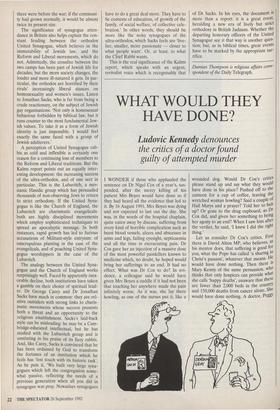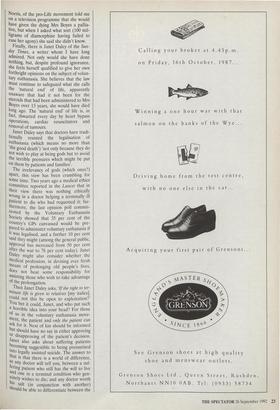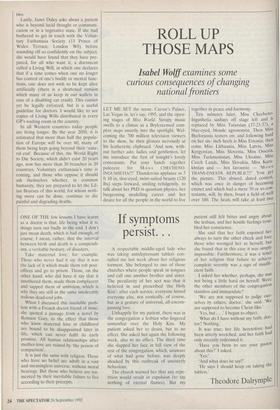WHAT WOULD THEY HAVE DONE?
Ludovic Kennedy denounces
the critics of a doctor found guilty of attempted murder
I WONDER if those who applauded the sentence on Dr Nigel Cox of a year's, sus- pended, after the mercy killing of his patient Mrs Boyes would have done so if they had heard all the evidence that led to it. By 16 August 1991, Mrs Boyes was dying and not expected to last out the day. She was, in the words of the hospital chaplain, quite eaten away by disease, suffering from every kind of horrible complication such as burst blood vessels, ulcers and abscesses in arms and legs, failing eyesight, septicaemia and all the time in excruciating pain. Dr Cox gave her an injection of a massive dose of the most powerful painkillers known to medicine which, no doubt, he hoped would bring her sufferings to an end. It had no effect. What was Dr Cox to do? In evi- dence, a colleague said he would have given Mrs Boyes a cuddle if it had not been that touching her anywhere made the pain infinitely worse. As it was, she lay there howling, as one of the nurses put it, like a wounded dog. Would Dr Cox's critics please stand up and say what they would have done in his place? Pushed off to the canteen for a cup of coffee, leaving the wretched woman howling? Said a couple of Hail Marys and a prayer? Told her to belt up? Or gone to the drug cupboard, as Dr Cox did, and given her something to bring her agony to an end? When I saw him after the verdict, he said, 'I knew I did the right thing.' Let us consider Dr Cox's critics. First there is David Alton MP, who believes, as his mentor does, that suffering is good for you, what the Pope has called 'a sharing in Christ's passion', whatever that means. He i would have done nothing. Then there is Mary Kenny of the same persuasion, who thinks that only hospices can provide what she calls 'happy deaths', unaware that there are fewer than 2,000 beds in the country and 150,000 deaths from cancer alone. She would have done nothing. A doctor, Peggy Norris, of the pro-Life movement told me on a television programme that she would have given the dying Mrs Boyes a pallia- tive, but when I asked what sort (100 mil- ligrams of diamorphine having failed to ease her agony) she said she didn't know. Finally, there is Janet Daley of the Sun- day Times, a writer whom I have long admired. Not only would she have done nothing, but, despite profound ignorance, she feels herself qualified to give her own forthright opinions on the subject of volun- tary euthanasia. She believes that the law must continue to safeguard what she calls the 'natural end' of life, apparently unaware that had it not been for the steroids that had been administered to Mrs Boyes over 13 years, she would have died long ago. The 'natural end' of life is, in fact, thwarted every day by heart bypass operations, cardiac resuscitators and removal of tumours.
Janet Daley says that doctors have tradi- tionally resisted the legalisation of euthanasia (which means no more than `the good death') 'not only because they do not wish to play at being gods but to avoid the terrible pressures which might be put on them by patients and families'.
The irrelevancy of gods (which ones?) apart, this view has been crumbling for some time. Two years ago a medical ethics committee reported in the Lancet that in their view there was nothing ethically wrong in a doctor helping a terminally ill patient to die who had requested it; fur- thermore, the last opinion poll commis- sioned by the Voluntary Euthanasia Society showed that 35 per cent of the country's GPs canvassed would be pre- pared to administer voluntary euthanasia if it was legalised, and a further 10 per cent said they might (among the general public, approval has increased from 50 per cent after the war to 78 per cent today). Janet Daley might also consider whether the medical profession, in devising ever fresh means of prolonging old people's lives, does not bear some responsibility for assisting those who wish to take advantage of the prolongation.
Then Janet Daley asks, 'If the right to ter- minate life is given to relatives [my italics], could not this be open to exploitation?' You bet it could, Janet, and who put such a horrible idea into your head? For those of us in the voluntary euthanasia move- ment, the patient and only the patient can ask for it. Next of kin should be informed but should have no say in either approving or disapproving of the patient's decision. Janet also asks about suffering patients becoming suggestible to being pressurised into legally assisted suicide. The answer to that is that there is a world of difference, as any doctor will tell you, between a suf-
fering patient who still has the will to live
and one in a terminal condition who gen- uinely wishes to die; and any doctor worth his salt (in conjunction with another) should be able to differentiate between the two.
Lastly, Janet Daley asks about a patient who is beyond lucid thought or communi- cation or in a vegetative state. If she had bothered to get in touch with the Volun- tary Euthanasia Society (13 Prince of Wales Terrace, London W8) before sounding off so confidently on the subject, she would have found that they have pre- pared, for all who want it, a document called a Living Will, in which one declares that if a time comes when one no longer has control of one's bodily or mental func- tions, one does not wish to be kept alive artificially (there is a shortened version which many of us keep in our wallets in case of a disabling car crash). This cannot yet be legally enforced, but is a useful guideline for doctors. I would like to see copies of Living Wills distributed in every GP's waiting room in the country.
In all Western countries today people are living longer. By the year 2050, it is estimated that more than half the popula- tion of Europe will be over 60, many of them being kept going beyond their 'natu- ral end'. Because of this, the World Right to Die Society, which didn't exist 20 years ago, now has more than 30 branches in 20 countries. Voluntary euthanasia's time is coming, and those who oppose it should ask themselves whether, in common humanity, they are prepared to let the Lil- ian Boyeses of this world, for whom noth- ing more can be done, continue to die painful and degrading deaths.




































































 Previous page
Previous page